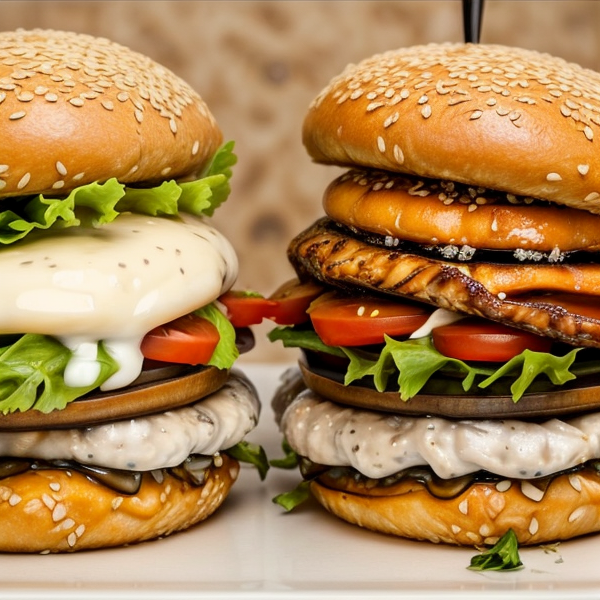Food Intolerances vs. Allergies in Veganism

Title: Food Intolerances vs. Allergies in Veganism
Introduction
Veganism is a lifestyle choice that involves abstaining from consuming animal products, including meat, dairy, eggs, and honey. While many people adopt veganism for ethical, environmental, or health reasons, it’s essential to understand the difference between food intolerances and allergies. In this article, we will explore the differences between these two conditions and provide tips on how to manage them while maintaining a vegan diet.
What are Food Intolerances?
A food intolerance occurs when your body has difficulty digesting certain foods due to a lack of specific enzymes or other components needed to break down those foods properly. This can lead to unpleasant symptoms such as bloating, gas, diarrhea, headaches, fatigue, and skin irritation. However, unlike an allergy, a food intolerance does not involve the immune system, and therefore, exposure to the problematic food may not cause a severe reaction.
Common Food Intolerances in Vegans
Some common food intolerances among vegans include:
1. Lactose intolerance: The inability to digest lactose, a sugar found in milk and other dairy products. This can be managed by avoiding dairy products or consuming lactase supplements or fortified plant-based milks.
2. Gluten intolerance: A sensitivity to gluten, a protein found in wheat, barley, and rye. Celiac disease is a severe form of gluten intolerance that damages the small intestine. Non-celiac gluten sensitivity is less severe but still causes discomfort. Both can be managed by avoiding gluten-containing grains and choosing gluten-free alternatives.
3. FODMAP intolerance: An intolerance to fermentable oligosaccharides, disaccharides, monosaccharides, and polyols (FODMAPs), which are short-chain carbohydrates found in various fruits, vegetables, legumes, and grains. This can cause similar symptoms to lactose intolerance and gluten sensitivity. Managing a FODMAP intolerance involves identifying high-FODMAP foods and limiting or avoiding them.
What are Food Allergies?
A food allergy occurs when your immune system mistakenly identifies a harmless food protein as harmful and produces antibodies against it. When you consume this food again, your immune system releases histamine and other chemicals to fight off the perceived threat. This can lead to a range of symptoms, including hives, swelling, difficulty breathing, vomiting, and even anaphylaxis, a life-threatening condition that requires immediate medical attention.
Common Food Allergies in Vegans
While vegans do not eat animal products, they can still develop food allergies to plant-based foods. Some common food allergens among vegans include:
1. Peanuts and tree nuts: These are among the most common food allergens worldwide and can cause severe reactions. They are often used as ingredients in vegan baked goods, sauces, and other dishes.
2. Soybeans and soy products: Soy is a popular source of protein for vegans, but some people may be allergic to it. Symptoms of a soy allergy can range from mild to severe.
3. Legumes: Beans, peas, and lentils are excellent sources of protein and fiber for vegans, but some people may be allergic to them. Common symptoms include skin irritation, digestive issues, and respiratory problems.
4. Sesame seeds and sesame oil: While sesame seeds are commonly used in Asian cuisine, they are also becoming more prevalent in Western vegan cooking. Sesame seed allergy is relatively rare but can cause severe reactions.
Managing Food Intolerances and Allergies while Vegan
If you have a food intolerance or allergy, it’s crucial to identify the trigger food and eliminate it from your diet. Here are some tips for managing food intolerances and allergies while maintaining a vegan diet:
1. Read labels carefully: Check ingredient lists for hidden sources of allergens. Even if a product doesn’t contain an allergen, it may be processed in facilities that also process allergenic foods.
2. Choose whole foods over processed ones: Many processed foods contain added sugars, preservatives, and other additives that can exacerbate symptoms. Opt for fresh, whole foods instead.
3. Cook at home: Preparing meals at home allows you to control what goes into your food and helps ensure that you don’t accidentally consume something you’re allergic to.
4. Learn about cross-contamination: If you have a food allergy, it’s important to avoid cross-contamination with other foods. Use separate utensils, cutting boards, and storage containers for allergenic and non-allergenic foods.
5. Consider working with a registered dietitian: A registered dietitian can help you create a balanced, nutrient-dense vegan diet that meets your individual needs and avoids potential triggers.
Conclusion
In conclusion, both food intolerances and allergies can occur in vegans, just like anyone else. It’s essential to understand the difference between the two and take steps to manage any underlying issues. By following these tips and working closely with a healthcare professional, you can enjoy a delicious and nutritious vegan diet while minimizing the risk of adverse reactions.
